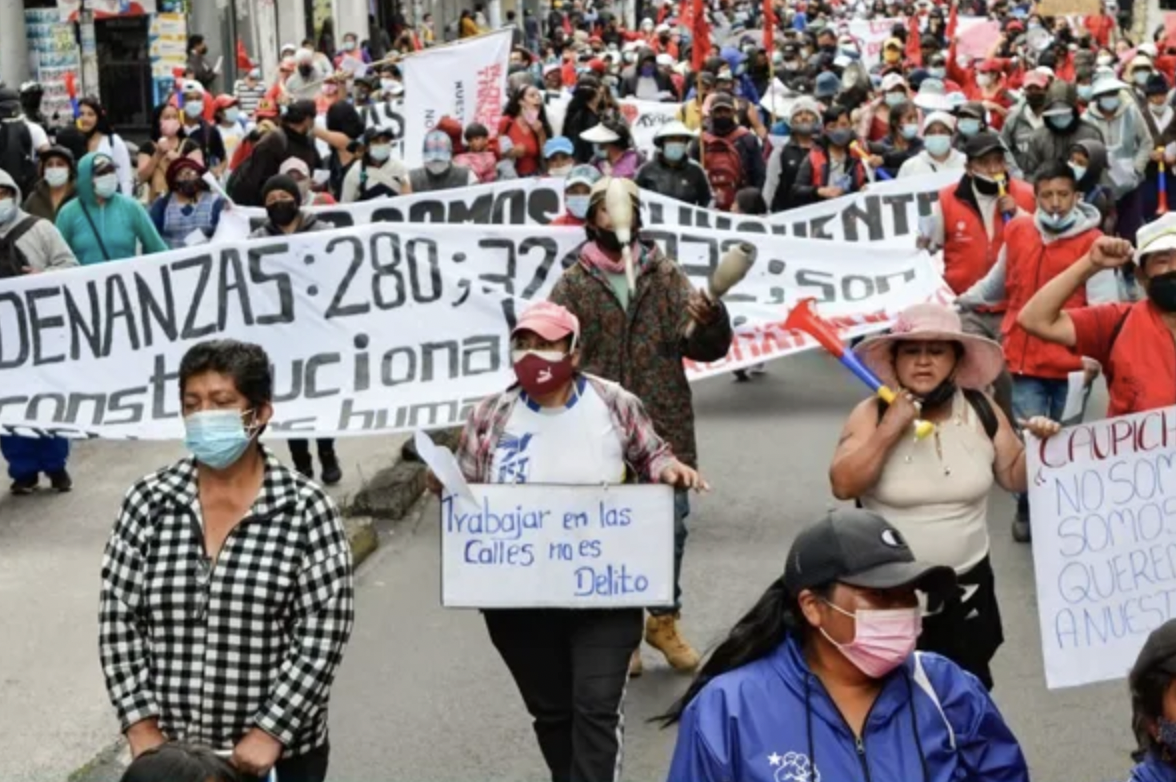The mobilization will begin at two thirty in the afternoon in El Arbolito park, in the north center of Quito.
“October is a month of struggle and it must be vindicated,” says Carlos Realpe, spokesman for the Proletarian Bloc, a social front that brings together several popular organizations, and which is leading the call for the march to be held this Wednesday, October 13, 2021, in Quito.
Self-employed workers, students, social activists, community members who reject mining in their territories and independent groups will take to the streets. According to Realpe, they will do it to protest against the extractivist policy of President Guillermo Lasso, the job insecurity in the country and the increase in fuel prices. It will start at two in the afternoon from El Arbolito park and will go to the historic center.
For Realpe, far from changing living conditions in Ecuador, the Lasso government has deepened the “anti-popular measures with the deals with the International Monetary Fund (IMF).” On October 4th, the international organization disbursed $802 million through the Expanded Service (SAF) program, as announced by the Ministry of Economy and Finance. The SAF was approved in early September, to ensure fiscal sustainability. According to the IMF report on the agreement, the Ecuadorian government committed to reducing public debt and “creating buffers through a consolidation strategy” to protect the most vulnerable, which will be “complemented by a reform of progressive taxes.”
Carlos Realpe believes that the labor policy of President Lasso becomes precarious and that is why, from his activism and the organization to which he belongs, categorically rejected the draft Law of Creating Opportunities, which the president intended to outline his labor roadmap and his economic and tax plan, but which the Council of the Legislative Administration (CAL) did not qualify on September 29th.
The draft law had several proposals that caused rejection among social sectors, among them, three alternative labor contracts added to those already stipulated in the current Labor Code. In addition, it raised 13 grounds for dismissal – current regulations establish eight – without the need for approval as a mandatory administrative procedure and compensation from worker to employee if he was dismissed for any of those grounds.
For economist John Cajas, Guillermo Lasso’s labor proposal directly undermined the stability of the workers. But he also says it was important to look at it holistically. “Although if an employer dismisses a collaborator for one of the reasons and he tries to challenge, they are not on equal footing. The balance always falls on the employer,” he questioned.
Carlos Realpe says that during the march voices will also be raised about unemployment in Ecuador, which was even mentioned by President Lasso in official figures. During his speech in the National Assembly on September 24th, before the presentation of the bill Creating Opportunities, the President said that only 3 out of 10 Ecuadorians of the economically active population have a formal job; that is, 70% of Ecuadorians work in the informal sector. Lasso also indicated that in rural areas the situation worsens: only 2 out of 10 people have a job. In general terms, he pointed out, 5.8 million people do not have a stable permanent job in the country.
Another of the demands of the social organizations for which they will take to the streets, says Carlos Realpe, is the rejection of Decree 151 of last August 5th. This provided that the Ministry of Energy and Non-Renewable Natural Resources disseminate “at the national level the conditions in which legal and responsible mining must take place in the country” in order to attract foreign investment. The document provides for the promotion of regulations on processes of prior, free and informed consultation of indigenous peoples and nationalities. However, for Realpe the decree is a way to open the way for transnational companies without taking into account the needs of the communities.
“The only way out for the people is a revolution, the change of the economic base,” says Realpe. In addition, the mobilization will protest the repression experienced by self-employed merchants in the streets, as denounced by the Association of Self-Employed Workers of Ecuador, and their fight for access to higher education.


0 Comments